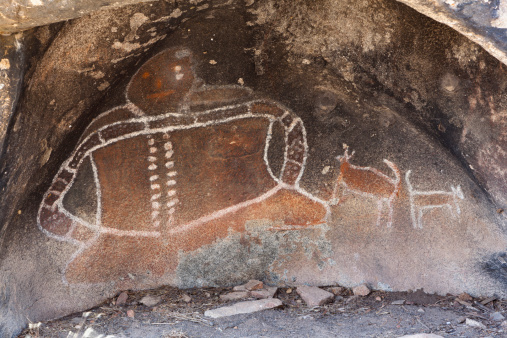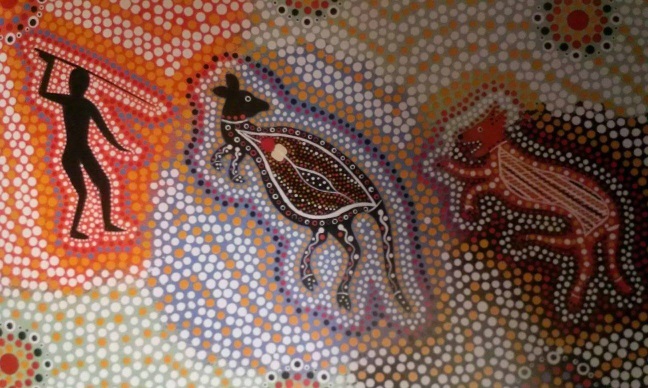NOBLE SPIRIT
Guardian and Creator
|
When the first dingoes travelled upon land bridges from Asia to Australia some 18,000 years ago, they found a country rich in provision that was occupied by a people who readily accepted them into their lives.
Of all animals, the dingo is one of the most well-represented in Indigenous Australian mythology, and is included in the Dreamtime (the creation of life, humans, plants and animals) and the Dreaming (core Indigenous values and spirituality). Throughout Indigenous Mythology dingoes are believed to live in the physical and spiritual realms, and considered valuable camp guardians due to their ability to perceive evil spirits that are undetectable by man. Dingoes were revered by Indigenous nations as ‘creators’, who were an irreplaceable part of ‘country’ and equal to man. Indigenous Australians would often acquire dingo pups from dens and tame them. They were shown great affection, and were given names, slept with humans at night, and were protected jealously. The dingo was so sacred in some tribes that women would nurse dingo pups from their own breasts. The significance of the dingo to Indigenous Nations is best conveyed through Dreamtime stories of different Nations. |
Gariwerd Creation Story
|
In the time before time, the Great Ancestor Spirit, Bunjil, began to create the world we see around us; the mountains, the lakes, the forests and the rivers, the plains and the seas. He created all the plants and all the animals.
When he had created the beautiful sandstone ranges of Gariwerd, he often took the form of Werpil the Eagle so that he could view his work. He looked over the cliffs and the mountains. He listened to the sound of water, dripping after rain and thundering over waterfalls. He watched the plants and animals grow- from moss and tiny blades of grass to tall sturdy gums; from birds that flew to animals that burrowed through the soil. Bunjil had a special place near Gariwerd. From there he could look out over the ranges. He is pictured there in Bunjils Shelter with his two helpers, two Wirringan, or dingoes. Bunjil appointed two brothers, the Bram-bram-bult brothers, sons of Druk the Frog, to finish the task he had set himself. Their job was to bring order to the new world; to name the animals and creatures, to make the languages and give the laws. At the end of his time on earth, Bunjil rose into the sky and became a star. He remains up there to this day, the protector of the natural world, his people and their beliefs. Meanwhile the Bram-bram-bult brothers had a big job, sorting things out here on earth. There was a huge, ferocious emu called Tchingal who lived on the flesh of people and animals. His home was in the malee scrub. He was hatching an enormous egg. One day while Tchingal was away from the nest, Waa the Crow flew past. Feeling hungry, Waa decided to have a peck at the egg. He was pecking away quite happily when Tchingal returned. The monster emu was furious. Waa fled across the country towards Gariwerd, with Tchingal right behind him. As he approached the ranges, Waa saw a crack in the mountains ahead. He flew into it, thinking he would be safe from Tchingal there. But Tchingal rushed at the mountain and struck it a mighty blow with his foot. The mountain split open under the force of the impact, releasing a mountain stream and creating a gap, Barigar, also known as Rose’s Gap. The emu could now see Waa flying off towards the west. He chased him through Barigar, right to the other side of the range. Waa spoiled another crack in the rockface. Desperately he tried to hide in it, but again Tchingal delivered a mighty kick to the rock and split it right open. This is how Jananginj Njaui (Victoria Gap) was formed where Bugara (Glenelg River) passes out onto the western plains. With the sun low on the horizon, Tchingal decided to make his camp at the foot of the new gap. This is why the place is called Jananginj Njaui, which means “the sun will go”. The next morning Waa rose early and escaped to the nearby Moora Moora swamp. As this was his totem site, and therefore sacred territory, Tchingal was forbidden to follow him there. Tchingal was angry and he was also very hungry. Just at this moment he spied a man, Bunya, out hunting in the distance. He decided to make a meal of him. When Bunya, who was not very brave, realised the emu was after him, he took off as fast as he could. Instead of using his spears to protect himself, as a warrior should, he threw them to the ground and scrambled up a large tree. Tchingal, not being able to climb, decided to wait. He knew that Bunya would have to come down some time. |
Bunjil and his Wirringan. Bunjil’s Shelter, Gariwerd National Park, VIC
Meanwhile, Waa the Crow had flown north to where the Bram-bram-bult brothers were staying. He told them of his narrow escape and of Tchingal’s ferociousness. Already angry at the emu for his bad deeds, the two brothers decided to punish him.
They came down to the mountains and saw what they thought was a bright star shining- it was Tchingal’s eye. Approaching the bird from different directions, the brothers crept up and threw their spears. One struck the emu in the chest, one in the rump, and one in the neck. Tchingal raged and stormed at the brothers, but he was fatally wounded. He ran off towards the northern plains, losing blood all the time. Soon he died, and the trail of blood he left behind him turned into the Wimmera River. The Bram-bram-bult now approached the tree where Bunya had hidden. They told him to come down, but Bunya was too scared and called back that he would stay there until they made sure Tchingal was dead. The elder brother was angry at such cowardice. He waved his spear and caused Bunya to become a possum, telling him to always stay in the treetops and to hunt for his food only at night. Reaching the spot where Tchingal had died, the brothers plucked all the feathers from his body. Splitting each feather down the centre, they threw one half to the left, the other to the right, making two piles of emu feathers, each the size of a present day emu. The splitting of the feathers can still be seen in all emus. Their feathers are double, with two separate halves. Before leaving, the Bram-bram-bult ordered the two emus to divide their large egg into several smaller ones in future, so they wouldn’t be as jealous of their one egg as Tchingal had been. In this way they hoped to keep the peace. Now, if you look at the Southern Cross, you can see the story told in the stars. At the head of the Cross is Bunya, the timid possum. Three of the stars are the spears hurled by the Bram-bram-bult. The large western star is the spear-that struck Tchingal in the chest, the smaller star next to it is the spear that passed through his neck, and the star at the bottom of the Cross is the spear that struck him in the rump. Tchingal himself is the dark shape that lies next to the Southern Cross. The eastern star of the Cross is Druk, the mother of the Bram-bram-bult, and the two brothers are the Pointers of the Southern Cross. Waa the Crow is at a safe distance on the other side of the sky, as the star we know as Canopus. Source: Brambuk National Park and Cultural Centre |
Warrigal and the Mundurra, the old dingo and the hunter
|
Warrigul, the old dingo, crept towards the black wallaby. Tired and hungry, he moved with great care, because he was much too old to run down the bunderra if it spotted him. He was almost within striking distance when the wallaby raised its head sharply, spun on its hind legs, and was gone.
Warrigul wondered what had startled the bunderra, so he kept low and watched. He did not have long to wait. An old mundurra, a hunter, appeared out of the scrub. Warrigul growled angrily to himself, then sighed and decided to remain hidden till the old man had gone. The old man was just as angry, because he too had been tracking the bunderra. He too was wondering what had startled it, when out of the corner of his eye he noticed the crouching Warrigul. "You're not as good to eat as a bunderra," he muttered, "but I am so hungry that even a skinny warrigul will do." When Warrigul saw the old mundurra raise his tura - his spear - he sprang to his feet and trotted away. The mundurra gave chase but the pace was slow. Neither was swift because of their age. Both were weary from hunger. When Warrigul could run no further, he turned on the mundurra. "Why do you chase me, old brother?" he panted. The mundurra, who was also relieved to stop, stood over Warrigul with his spear still raised, though unsteadily. "I want to kill you and eat you," he replied. "And you are not my brother," he added scornfully. "Yet we are surely brothers of a sort," said Warrigul. "We are both lonely hunters, and our old age unites us more." The old mundurra scratched his beard as he considered this. Then he rested his tura on the ground and sat down to get his breath back. |
The Warrigal (old dingo) and the Mundurra (hunter) stalking the bunderra (black wallaby).
"Perhaps we are brothers, at least in spirit," he said.
"That's my point," said Warrigul. "So, what shall we do? Brothers may not kill each other, yet we both must eat." "And neither of us eats well any more," grumbled the old mundurra, who was as thin and bony as the dingo. Warrigul nodded and sighed, watching the old man closely. The mundurra sighed too, then scratched his beard again as he thought about their problem. "If we are brothers," he said finally,"and perhaps we are, then we should hunt together, and share what we catch. We might both eat better together than separately." And so they did. The old man and the old dingo hunted together, shared food and campfires together, and became close friends. So did all their descendants- men and dogs- who can be seen together in any baanya, or camp. Source: Tales of My Grandmother's Dreamtime, Volume 1, Niaura |












